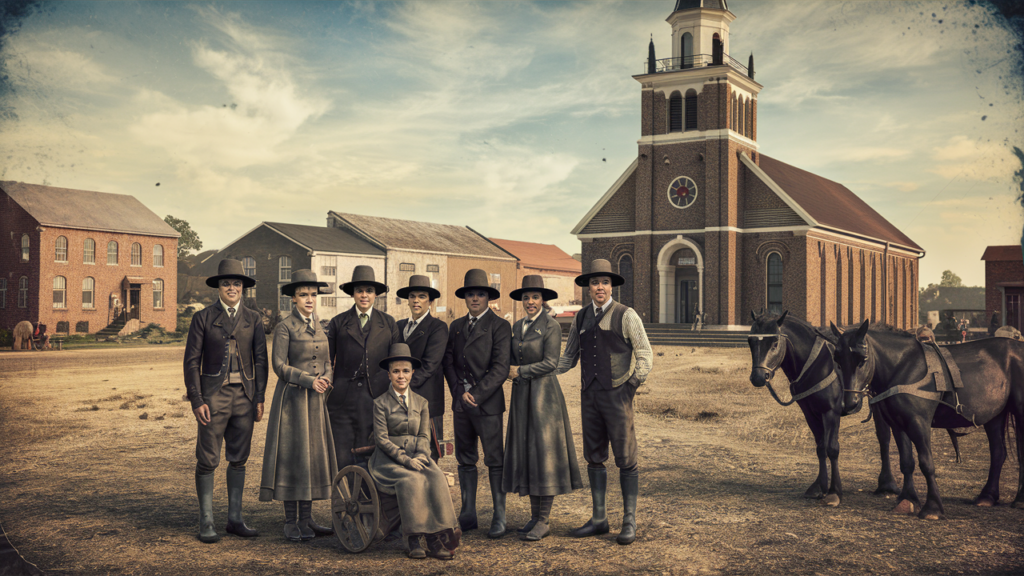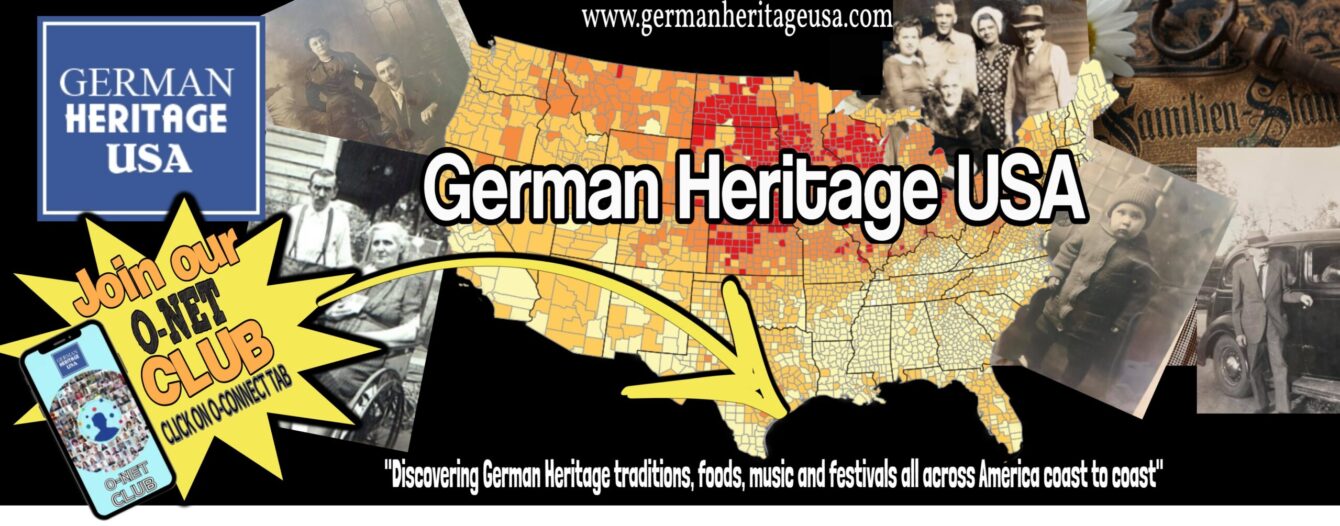Exploring America’s Top 25 Towns with German Influences
GERMAN HERITAGE USA | AFFILIATE DISCLAIMER: This post may or may not contain affiliate links which means we may receive a commission for purchases made through links. We will only recommend products that we have personally used or that we truly trust. Learn more on our Private Policy and Disclaimer Page located under our Terms Of Service tab above.
The tapestry of American history is woven with threads from many cultures, and German immigrants have played a significant role in shaping its landscape. Their influence is evident not just in traditions and cuisine, but also in the names of countless towns scattered across the nation.

Today, we embark on a linguistic and cultural journey, exploring the origins and stories behind 25 American towns with charmingly German names:
1. New Braunfels, Texas: Founded in 1845 by a group of German nobles seeking religious freedom, New Braunfels (“New Braunfels”) retains its European charm with its historic architecture, lively festivals like Wurstfest, and the iconic Schlitterbahn waterpark.
2. Frankenmuth, Michigan: Nicknamed “Little Bavaria,” Frankenmuth (“Franconian Courage”) boasts the world’s largest Christmas store, Bronner’s Christmas Wonderland. Founded in 1845 by Lutheran Bavarians, the town celebrates its heritage with Oktoberfests, traditional Bavarian meals, and lively polka music.
3. Karlsruhe, North Dakota: Established in 1883 by German settlers, Karlsruhe (“Charles’s Rest”) reflects its European roots in its Lutheran church, German restaurants, and traditional Maifest celebrations.
4. Heidelberg, Mississippi: Founded in 1870 by German immigrants, Heidelberg (“Hill Castle”) offers a glimpse into German culture with its annual Heidelberg Stein Show, a showcase of intricately carved steins.
5. Hermann, Missouri: Established in 1837 by German immigrants, Hermann (“Hermann the Cheruscan”) is known for its historic downtown, wineries, and the iconic Stone Hill Winery, established in 1859. Hermann MO Little Germany on the Missouri.
6. New Ulm, Minnesota: Founded in 1854 by German Revolutionaries, New Ulm (“New Ulm”) is a vibrant community that celebrates its heritage with its Glockenspiel (musical clock tower), German festivals, and the Hermann Monument, commemorating the town’s founder.
7. Fredericksburg, Texas: Established in 1846 by German immigrants, Fredericksburg (“Frederick’s Fortress”) is renowned for its Main Street lined with shops and restaurants, its annual Weihnachtsmarkt (Christmas market), and its proximity to wineries and breweries.
8. Bismarck, North Dakota: Named after the Prussian statesman Otto von Bismarck, this capital city boasts a rich German heritage evident in its architecture, museums, and cultural events like Bismarck Maifest.
9. Amana Colonies, Iowa: Founded in 1854 by German Pietists seeking religious freedom, the seven Amana Colonies (“Community”) offer a unique glimpse into communal living with their historic architecture, museums, and traditional crafts.
10. Frankenlust, Michigan: Established in 1863 by German Lutherans, Frankenlust (“Franconian Delight”) is a small town known for its historic church, German restaurants, and its annual Frankenmuth Bavarian Festival participation.
11. Helen, Georgia: Founded in 1969, Helen is a charming Bavarian-themed town nestled in the Appalachian Mountains. It attracts visitors with its Oktoberfest celebrations, traditional German architecture, and shops selling imported goods.
12. Berlin, Wisconsin: Established in 1849 by German immigrants, Berlin (“Berlin”) boasts a rich cultural heritage evident in its historic downtown, museums, and annual Maifest celebration.
13. Cincinnati, Ohio: Founded in 1788, Cincinnati (“Society of the Cincinnati”) is a vibrant city with a strong German influence. This is evident in its numerous breweries, its annual Oktoberfest Zinzinnati, and its historic Findlay Market with European-style vendors.
14. Allentown, Pennsylvania: Founded in 1762, Allentown (“Allentown”) was named after William Allen, Chief Justice of the Province of Pennsylvania. However, the city has a strong German heritage reflected in its annual Maifest celebration, its many German restaurants, and its historic churches.
15. Milwaukee, Wisconsin: Founded in 1846 by German immigrants, Milwaukee (“Mill on the Milwaukee River”) is known as the “Brew City” due to its numerous breweries, many of which were founded by German immigrants. The city also celebrates its German heritage with its annual German Fest.
16. Hamburg, New York: Established in 1823, Hamburg (“Hamburg”) is a historic town on the shores of Lake Erie. It retains its German heritage through its annual Hamburg Grape Festival, its German restaurants, and its historic architecture.
17. Hanover, Pennsylvania: Founded in 1731, Hanover (“Hanover”) was named after the House of Hanover, the British royal family at the time. However, the town has a strong German heritage reflected in its annual Hanover Wurstfest, its many German restaurants,
18. Westphalia, Kansas: Founded in 1859 by German immigrants, Westphalia (“Westphalia”) retains its heritage through its annual Maifest celebration, its German restaurants, and its historic St. Michael’s Church, built in 1875.
19. Leipzig, Ohio: Established in 1831 by German immigrants, Leipzig (“Leipzig”) boasts a historic downtown with German-style architecture. The town celebrates its heritage with its annual Leipzig Heritage Festival, featuring traditional food, music, and dance.
20. Leavenworth, Washington: It wasn’t always the Bavarian wonderland it is today. Originally a railroad and timber town, Leavenworth faced economic decline after the railroad rerouted in the 1920s. In the 1960s, seeking to revitalize the town, community leaders embraced its alpine setting and transformed it into a Bavarian-inspired village.

Drawing inspiration from towns like Bemalte Fassaden, Leipzig, and Munich, Leavenworth adopted half-timbered architecture, glockenspiel music, and festive traditions. While not truly German, the town’s charming facade and dedication to Bavarian culture attracts millions of visitors each year, offering a unique European experience in the heart of Washington.
21. Straubsville, Pennsylvania: Founded in 1753 by German immigrants, Straubsville (“Straub’s Town”) holds an annual Apple Dumpling Festival, a testament to its German baking traditions. The town also boasts the historic Zion Evangelical Lutheran Church, built in 1830.
22. Fredericksburg, Virginia: Founded in 1727, Fredericksburg (“Frederick’s Town”) was named after Prince Frederick, son of King George II. However, the town has a significant German population, evident in its annual Christkindlmarkt (Christmas market) and its German restaurants.
23. Karlsruhe, Illinois: Established in 1854 by German immigrants, Karlsruhe (“Charles’s Rest”) celebrates its heritage with its annual Maifest, featuring traditional German food, music, and dance. The town also boasts a historic Lutheran church built in 1872.
24. Stuttgart, Arkansas: Founded in 1855 by German immigrants, Stuttgart (“Stuttgart”) is known as the “Rice and Duck Capital of the World.” The town celebrates its German heritage with its annual Ducktoberfest, featuring duck racing, German food, and live music.
25. Düsseldorf, South Dakota: Established in 1885 by German immigrants, Düsseldorf (“Düsseldorf”) features a historic Main Street with German-style architecture. The town celebrates its heritage with its annual Schützenfest, a marksmanship competition with German food, music, and dance.
This list merely scratches the surface of the numerous American towns with German names and rich cultural heritages. From the bustling urban centers like Cincinnati and Milwaukee to the quaint Midwestern towns like New Glarus and Hermann, these communities offer a unique blend of German traditions and American spirit. Exploring their stories allows us to appreciate the diverse tapestry woven into the fabric of American history.
This list is just a starting point for your exploration. There are many other charming towns with German names across the United States, each with its own unique story to tell. Consider venturing beyond the beaten path and discovering hidden gems like:
Whether you’re drawn to German architecture, cuisine, or cultural traditions, these towns offer a delightful journey into the heart of America’s rich cultural heritage.
So, pack your bags, grab your phrasebook, and embark on your own transatlantic adventure!
